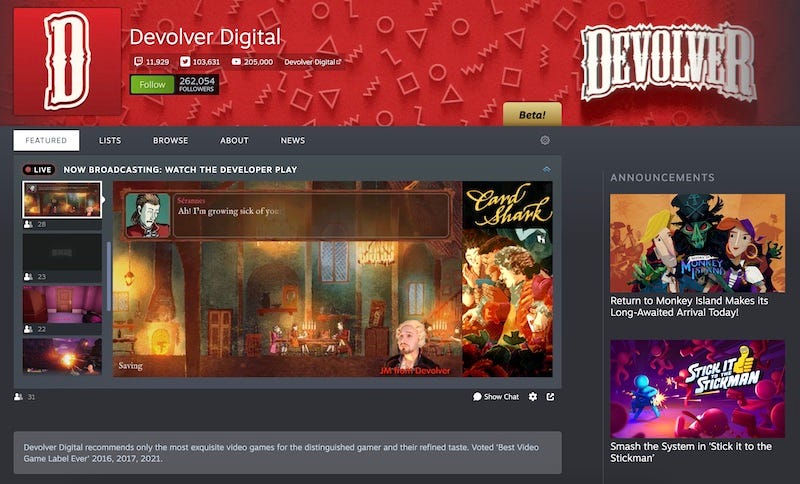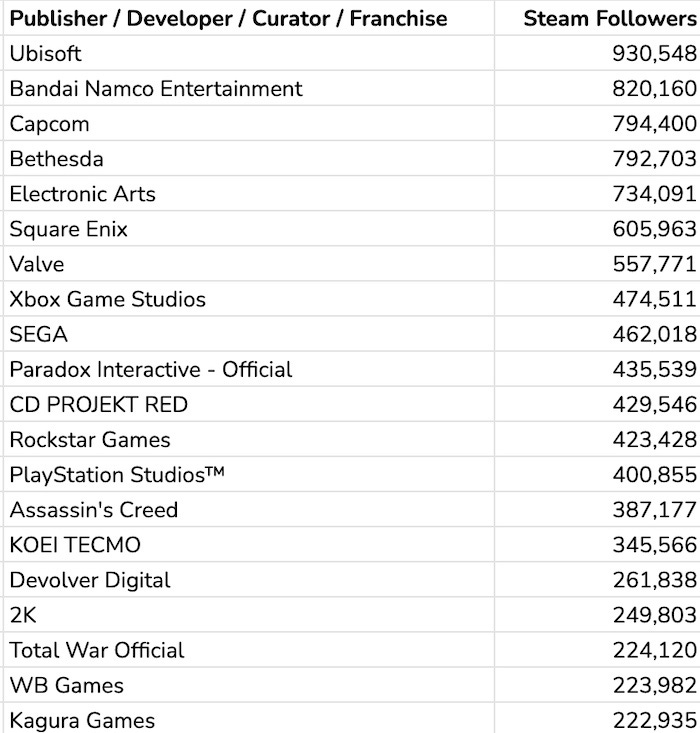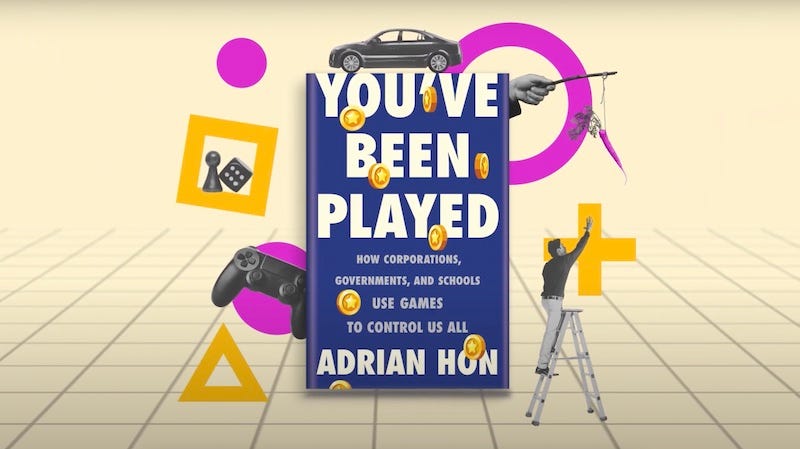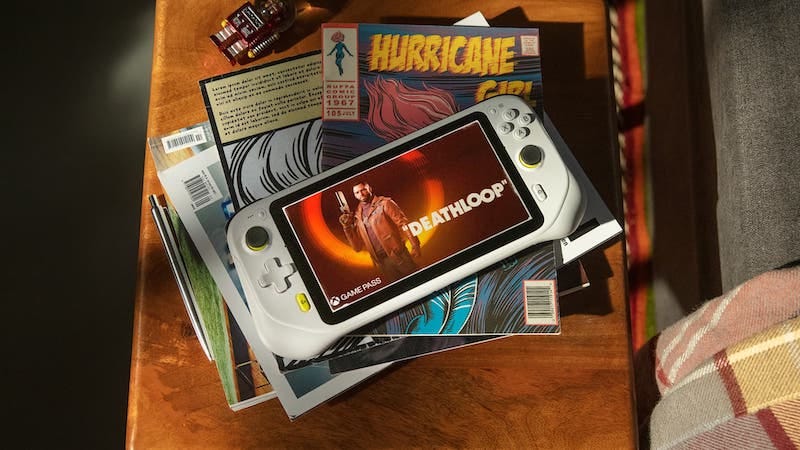Publishers, and their 'hidden' Steam advantage?
Publikováno: 22.9.2022
Also: the gamification of... games?
[The GameDiscoverCo game discovery newsletter is written by ‘how people find your game’ expert & company founder Simon Carless, and is a regular look at how people discover and buy video games in the 2020s.]
We have returned. And whether 13,000+ of you like it or not, we’re landing in your email box with a satisfying thunk this Wednesday - providing insight, data, and occasionally some light relief.
On that topic, before we start, strangled honks goes to Trombone Champ, the new viral novelty Steam breakout. Check out Northernlion playing it, if you want to sample its vibes - ‘deeply silly trombone-based rhythm game’ is a fun angle for a game!
[Heads up: we have that 25% off a GameDiscoverCo Plus paid subscription deal for the next few days. This includes an exclusive Friday PC/console game trend analysis newsletter, a big Steam ‘Hype’ & performance interactive data set, eBooks, a member-only Discord & more.]
Steam publisher pages: a ‘hidden’ win for some?
When it comes to game platforms like Steam, there’s a reasonable question to be asked. What does being a publisher, versus a solo developer, actually get you in terms of raw game discoverability?
Obviously, there are yearly publisher-specific sales, and cross-promo opportunities on Steam pages. But underdiscussed - or at least underquantified - is the customized publisher homepage that Steam provides, and which can be ‘followed’ by players.
As it happens, on the GameDiscoverCo Plus Discord, Maciek from 11-Bit Studios (Frostpunk) - which has its own publisher homepage with 205,000 followers, btw - asked whether anyone had a list of the top publisher/creator homepages.
And when they didn’t, he and his team went and scraped the data - including all 7,749 publisher & franchise pages, wow - which they’ve made available to us here over on Google Drive. Just commenting on why these pages are important:
If players follow your publisher page, they get emailed when new games come out: Valve notes: “[Publisher followers] will receive an email when your game launches or enters early access or exits early access.” So for 11-Bit, that’s up to 205,000 extra people for each game they release - which is a major amplifier.
Your other games will be seen more often by Steam players: Also a big deal, per Valve: “When [players] are browsing either the Steam front page or a genre and/or tag Steam hub page, we will mix in your recently released games into their main capsules. We will also remind them why we are showing them the capsule.”
There are a number of other incremental wins: We also note that some new Steam tag pages now have a ‘Recommended new releases from familiar publishers and developers’ section. Interestingly, when we log in, some of the recommendations are for publishers whose game we have played, but we haven’t followed. (But maybe if you have followed, it could help get you on that list?)
So who are the Top 20 most-followed publishers on Steam? We now have this information, thanks to 11-Bit’s work:
Results are somewhat as expected. There’s some franchises in the Top 20 in addition to publishers - Assassin’s Creed (which isn’t even actively publishing on Steam right now!) and Total War. And maybe the adult RPG/visual novel creator Kagura Games being in this list is a little surprising? But, smut…
It’s also worth working out where your publisher ranks: the top 40 publisher & franchise pages have at least 100,000 followers, the top 85 have at least 50,000, and the top 300 have at least 10,000 followers. That should - at least - give you some context, right?
As for if you should aggressively push people to follow your publisher page - we think it’s good to include it in the marketing mix, but not at the expense of getting people to wishlist individual games, of course. But it’s a hidden publisher discovery ‘bonus’ that doesn’t always get talked about much…
The gamification of… video games?
So, Zombies, Run! co-creator - and subscriber to this newsletter - Adrian Hon releases his new book, You’ve Been Played, this week, and it’s described as “a blistering takedown of how corporations, schools, and governments use games and gamification as tools for profit and coercion.”
You might be, like, ‘gamification, what’s that got to do with us?’ But beyond the wider cultural ramifications of, say, Amazon gamifying its warehouse work, Adrian actually devotes an entire chapter of the book to ‘the gamification of games’ (!) He explains:
“Why would games need to gamify themselves? The question seems absurd. Generic gamification borrowed concepts like scores, achievements, experience points, and missions from video games in hope of becoming fun itself, but video games are already fun. These systems were originally created by games not to be entertaining in and of themselves, but to recognise players’ progress and help them set goals.
Yet just as companies and workplaces have used generic gamification to coerce people to do things they haven’t chosen and aren’t in their best interests, the video games industry has repurposed those systems for the same goal: to make as much money as possible.”
Some of the key examples of this, as far as Hon is concerned? Elements like the following:
Achievements: when Xbox first launched them in 2005, “Microsoft’s goal was clear: increased player engagement - that is, more time spent playing and talking about Xbox games - and with it, increased profit.” Given some of the obsessions we still see over Steam, Xbox, and PlayStation Gamerscore equivalents, hard to argue.
Loot boxes and gacha: with regard to FIFA Ultimate Team: “EA’s inspiring mottos from its early 1980s days, ‘We see farther’ and ‘Can a computer make you cry?’ seem laughable in light of ‘surprise mechanics.’ No one can fault a company for exploring new ways to make money, but for many, loot boxes are a manipulation too far.”
Compulsion loops: we don’t get too far into this existential question, generally, but: “Though players may laugh at the late nights and bleary mornings caused by Civilization and Spelunky and say it’s all fine in moderation, it is deeply disingenuous to suggest that some video games aren’t designed to keep us playing for far longer than we intended to, much more so than the most bingeable TV, or page-turning novel, or any other solo activity I can think of.”
Don’t take the book for too much of a scold, though. I do think it’s reasonable to say - even for games that don’t monetize that way - “we ought to be attentive to the power of compulsion loops and treatmills and how they might be moderated.”
On the other hand, perhaps this conclusion is close to the bone: “The gamification of video games can make them more fun, but more often than not, it introduces unwelcome grind and compulsive behaviour. The games industry posts record revenues every year, but the manipulation continues because it can never have enough money. Should we be surprised? That’s capitalism, after all.”
Indeed it is! Go check out Adrian’s book if interested. (I really enjoyed it.) There’s a book review over at the New York Times, if you’d like to get another perspective on it.
The game discovery news round-up..
After that bracing cold shower, let’s look at some notable game discovery and platform news for the week, before Friday’s Plus-exclusive game analyses? Let’s go:
Logitech has now announced the Logitech G Cloud Gaming Handheld (above), which is USD $299 on pre-order and $349 when released. It “was developed in partnership with Tencent Games and supports cloud streaming from Xbox Game Pass Ultimate and NVIDIA GeForce NOW. Players can also stream local games from an Xbox console with the Xbox app, their Steam games via SteamLink or download remote play apps, video streaming, and more via the Google Play Store.”
Twitch is having a bit of a torrid time - a subscription revenue share change for streamers (in Twitch’s favor) is getting blasted, the just-announced partial gambling ban is either not far enough or too far, depending on who you talk to… it’s rough to be the king, sometimes?
VR watchers, did you know about VRDB? It scrapes a whole bunch of useful data across Quest, App Lab, and Steam VR (discounts, version updates), and also has detailed review history for individual Quest apps, apparently?
Sales milestones? Mechanistry has announced that Timberborn sold over 750.000 copies across all PC-platforms since September 2021; Gameloft announced that Disney Dreamlight Valley reached 1 million paid users - across multiple PC & console platforms - since Sept. 6th; Square Enix announced that Octopath Traveler reached 3 million copies sold LTD since July 2018.
Nvidia made a whole bunch of announcements at its GTC event this week. And the free Portal update with RTX was the vanguard of its gaming thrust - the idea that “Nvidia's new modding tools will add ray tracing to almost anything, even Morrowind.” (In other words, if devs aren’t going to add super high-end graphics card flourishes, we’ll do it for them, dammit.)
NPD’s August U.S. game hardware and (select) software charts are upon us, and spending was down 5% YoY to $4.1 billion. Oh, and “Marvel's Spider-Man jumped to 3rd on the best-selling titles chart for August - up from 84th in July” thanks to its Steam debut. (That’s multiplatform for you, baby!)
Unity has been prioritizing improving its multiplayer services (good!) via a curiously reverse-engineered survey saying it was a great idea (not so good?), leading to a Unity VP saying in a WaPo interview that “we don’t work very hard on” supporting turn-based games because of… the survey. Anyway, “new self-serve features for Game Server Hosting and Matchmaker” - thumbs up.
Microlinks: there’s a new PlayStation VR2 trailer which shows off both gameplay and hardware features; European data (minus the UK & Germany) showed GTA V sales beating out Saints Row in August; the new Quest OS update will stabilize your shaky VR recordings
Sony’s Shu Yoshida was interviewed over at GI Live, and he repeated Sony’s view on the utility of PlayStation Plus: “We believe in the premium release of a title at launch.” And after a few months (or years), “when the game's sales come down, inclusion into this service, PS Plus Extra, can help introduce these games to new, broader audiences.” It’s still ‘experimental’, but that’s the company line.
It’s odd to think stores only allow certain ‘pricing increments’, but they do! Relatedly - Apple is increasing App Store prices across Europe and in some Asian markets as currencies weaken against the strong US dollar: “All Euro markets, except Montenegro, will see the base €0.99 app pricing move to €1.19 next month, a 20 percent jump. In Japan the hikes are more than 30 percent.”
Former Sony Interactive Entertainment America president and CEO Shawn Layden has joined Tencent Games as a strategic advisor: “Breaking the news on Linkedin, Layden said he's been brought in to advise, assist, and support the Tencent Games team as it attempts to ‘deepen’ its activities within the games industry.” (But seriously, how much ‘deeper’ can they get, eh?)
Microlinks, Pt.2: is telling players how long a video game takes to beat a bad idea?; the Xbox dashboard September update includes a re-org of your ‘Full Library’ view; fellow newsletter lords Naavik have an essay contest if anyone wants to write about ‘video game numbers’.
Finally, I continue to find Media Molecule’s Dreams fascinating. The creativity and tools for the PlayStation-exclusive game/productivity tool - given you can only make content using a controller - is just outta control. Example #245214, below:
[We’re GameDiscoverCo, an agency based around one simple issue: how do players find, buy and enjoy your premium PC or console game? We run the newsletter you’re reading, and provide consulting services for publishers, funds, and other smart game industry folks.]



